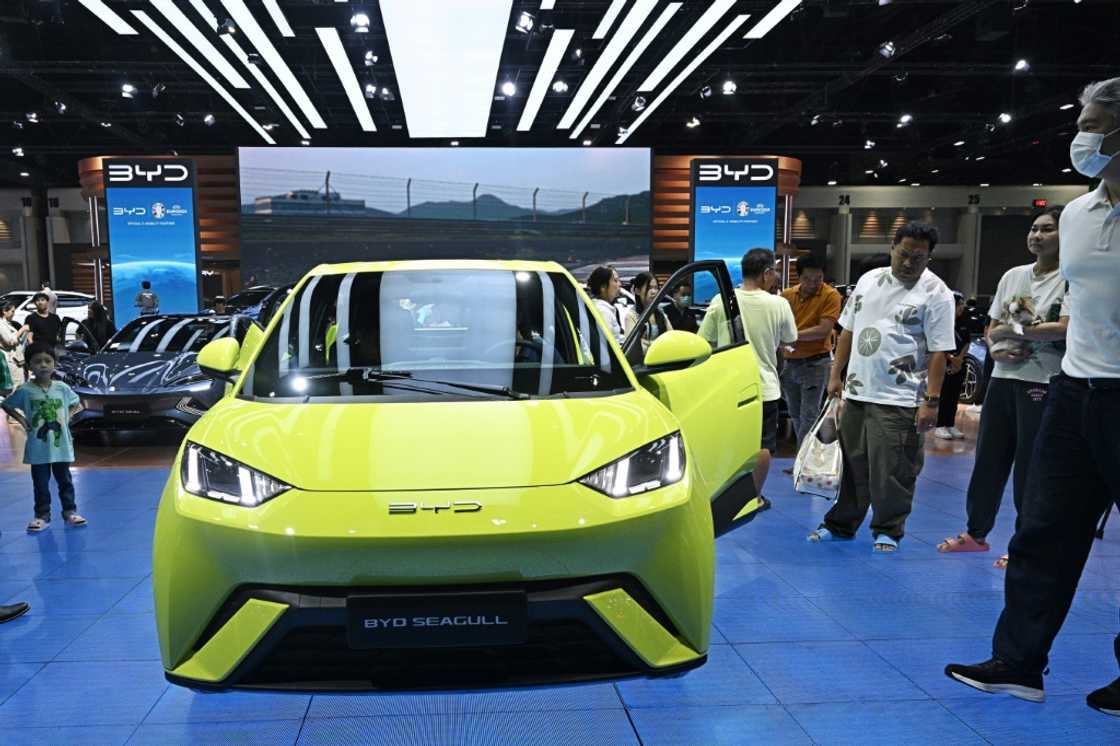Turkey puts its best foot forward to charm Chinese investors

Source: AFP
Turkey plans to draw on its geographical position and an EU customs deal to entice Chinese investors keen to access European markets tariff-free, as it recently just did with carmaker BYD.
The Chinese electric vehicle giant signed a billion-dollar deal with Ankara on Monday to open a plant in western Turkey, promising to create 5,000 jobs, a move that will help it dodge new EU tariffs.
The country, at the crossroads between Europe, the Middle East and Central Asia, is in talks with other Chinese companies, Turkey's Industry and Technology Minister Mehmet Fatih Kacir said this week.
"We want to transform Turkey into a production centre for the next generation of vehicles," Kacir told private broadcaster Haberturk.
The minister emphasised his country's selling points, including being part of the EU's customs union and having trade agreements with 28 countries.
"Chinese producers want rapid access to international markets," he said. "Investing in Turkey offers them that."
PAY ATTENTION: All celebrity news in one place! Follow YEN's Facebook Broadcast channel and read on the go.
The EU recently slapped additional provisional tariffs of up to 38 percent on Chinese EVs following an investigation that concluded state subsidies meant they were unfairly undermining European rivals.
But Ankara struck a customs deal with the EU in 1995 that enables the free flow between them of a number of goods, notably cars.
Turkey became one of the leading centres of the world's automobile industry starting in the 1970s, when major carmakers including Fiat and Renault opened plants there -- with others like Ford, Toyota and Hyundai following.
BYD's Turkish base will allow the Chinese EV specialist to bypass EU tariffs upped by Brussels in July, and enter European markets.
Under new regulations on investment incentives, BYD will be able to circumvent a new 40 percent tariff that Turkey originally imposed on electric vehicle imports. Manufacturers investing in the country will be exempt.
A new partnership
At least five other Chinese carmakers are now considering opening plants in Turkey, state-owned news agency Anadolu reported.
Turkish manufacturer TOGG and Chinese firm Farasis have also partnered up to produce EV batteries in Turkey.
Turkish officials have held numerous meetings with Chinese industrialists in the last year, the industry ministry said.
Turkey's foreign affairs minister Hakan Fidan visited China in June to seal a new bilateral deal, calling the countries "drivers of Asian wealth."
His visit to Xinjiang was the first by a high-ranking Turkish official since 2012. The west China province is where Beijing is accused of human rights violations against more than one million Uyghurs and other Muslim minorities.
Turkey's President Recep Tayyip Erdogan has previously deplored China's policy in Xinjiang, calling it "genocide" in 2009.
But Ankara has since toned down its rhetoric -- and Fidan in June reiterated the state's "total support for China's territorial integrity."
Former diplomat Gulru Gezer says that while it is important, China's treatment of the Uyghurs, who speak a Turkic langiage, is not the only issue on Beijing and Ankara's mutual agenda -- and it shouldn't hamper their relations.
"Fidan's visit supported this," she said. "The fact that Beijing let Fidan go into Xinjiang, talk to the population, were positive steps."
But not all experts see it that way.
"Welcoming more Chinese investment could change Turkey’s position on the Uyghur issue and push it to implement an extradition agreement," said Ceren Ergenc, an expert of China-Turkey relations at the Centre for European Policy Studies.
"This would have a very negative impact on the security of the Uyghur diaspora in Turkey," which hosts dozens of thousands of Uyghur refugees.
'Common ground'
Many countries, including EU members, want to attract Chinese firms looking to invest in Europe, and Turkey has only just started following suit, Ergenc said.
But obstacles remain, she said, citing an EU legal framework on foreign subsidies that could make it harder for China to "use Turkey as a springboard for Europe."
"In the past, Chinese companies considered that the economic situation in Turkey was not reliable enough, and preferred Hungary or Poland," the researcher said.
However, China and Turkey's warming relations are based on mutual interests, Gezer said.
"Ankara and Beijing share common ground, including a multipolar worldview. Their relations will continue to develop in the foreseeable future," she said.
Erdogan has confirmed his desire to join the Shanghai Cooperation Organisation, whose members include China, Russia and Iran, but where Turkey is only a partner.
New feature: Сheck out news that is picked for YOU ➡️ click on “Recommended for you” and enjoy!
Source: AFP





